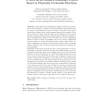10 search results - page 1 / 2 » Improved Privacy of the Tree-Based Hash Protocols Using Phys... |
138
Voted
SCN
2008
Springer
15 years 2 months ago
2008
Springer
In 2004, Molnar and Wagner introduced a very appealing scheme dedicated to the identification of RFID tags. Their protocol relies on a binary tree of secrets which are shared
147
Voted
IACR
2011
14 years 1 months ago
2011
Abstract. Radio Frequency Identification (RFID) systems are vulnerable to relay attacks (i.e., mafia, terrorist and distance frauds) when they are used for authentication purpose...
111
click to vote
PERCOM
2007
ACM
16 years 1 months ago
2007
ACM
Radio Frequency Identification (RFID) is an increasingly popular technology that uses radio signals for object identification. Tracking and authentication in RFID tags have raised...
133
click to vote
IJISEC
2010
15 years 22 days ago
2010
Physical Unclonable Functions (PUFs) are physical objects that are unique, practically unclonable and that behave like a random function when subjected to a challenge. Their use h...
129
click to vote
ISW
2009
Springer
15 years 8 months ago
2009
Springer
Abstract. In this work we utilize a physically unclonable function (PUF) to improve resilience of authentication protocols to various types of compromise. As an example application...

